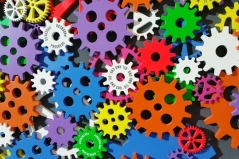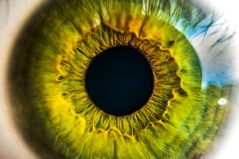The Naked Power: Understanding Nonverbal Communications of Power
keywords:
embodiment / nonverbal / power / vertical position
The Naked Power: Understanding Nonverbal Communications of Power
Because power is something we often avoid discussing openly, its nonverbal communication is fascinating to lay people and psychologists alike. When directly asked, people interpret many different nonverbal signs as indicating high or low power – unfortunately, these ideas are often exaggerated and misguided. Likewise, social psychologists still have no good understanding of the nonverbal cues to power. This article sheds more light on what is actually... / more
Creativity is More Than a Trait: It’s a Relation

keywords:
creativity / Csikszentmihalyi / system model
Creativity is More Than a Trait: It’s a Relation
What is all the commotion about creativity? Whatever definition this vogue expression is dressed in, it has apparently captured the awareness of countless authorities for educational, economical, governmental and last but not least, scientific issues. Moreover, the media is filled with references to creativity or its synonyms. Ochse (1990), the author of a renowned book on the determinants of creative genius, contested that "our quality of life, perhaps our very survival as a species,... / more
Are Stereotypes True?
keywords:
downward comparison / stereotype lift / stereotype threat / stereotypes
Are Stereotypes True?
Are African Americans really better at basketball than Caucasians? Are blonds really dumber than brunettes? Are women really worse at math than men? The short answer is yes. The longer answer is no. Let me explain by focusing on the stereotype that women can’t do math. At first glance, this stereotype seems to be true. For instance, men continue to outperform women on the math sections of the SAT and GRE, and... / more
Taking One for the Team, Even on Your Way Out of the Door
keywords:
empathy / organizational citizenship behavior / public good / social dilemmas
Taking One for the Team, Even on Your Way Out of the Door
Kaitlyn works Monday through Friday, 9-5. Sitting at her desk on Friday afternoon, Kaitlyn glances at the clock. It is 4:30 pm. The end of the workweek is a mere 30 minutes away. Visions of a relaxing weekend begin to creep in. And then, the phone rings. A distraught coworker is calling to ask for a big favor. His kids are really sick, he feels there’s no way he’s going to be able to prepare for an upcoming meeting on... / more
Altruism: Myth or Reality?
Altruism: Myth or Reality?
We humans devote much time and energy to helping others. We send money to famine victims halfway around the world—or to save whales. We stay up all night to comfort a friend with a broken relationship. We stop on a busy highway to help a stranded motorist change a flat tire. Why do we do these things? What is our motive? The dominant answer in Western thought is well expressed by the wise and witty Duke de la Rouchefoucauld, 2001: “The... / more
The Anatomy of Love
The Anatomy of Love
In May of 2000 a virus spread around the world. It infected 1200 computers within three hours, and was rattling around machines at the CIA, FBI, and Pentagon within a day. It shut down servers at The British House of Commons while the American Department of State was forced to temporarily disconnect its computers from the internet (BBC, 2000). Did some malevolent genius unravel the inner secrets of network crypto architecture? Was it a terrorist plot? No, actually, just a small virus tossed off by a Fillipino student disgruntled at having being kicked out of his computer science program. / more
Love at First Sight

keywords:
filial imprinting / love / similarity / visual impression
Love at First Sight
The song "Some Enchanted Evening" from Rodgers and Hammerstein’s South Pacific warns us that, when it comes to explaining love at first sight, "Fools give you reasons. Wise men never try." Notwithstanding this lyrical warning, more and more psychologists are trying to solve this age-old mystery. According to a recent survey, almost two out of three Americans believe in love at first sight (Naumann, 2001). The survey reported that over half of them have actually experienced it, and over half of... / more
Complementing Individualism with The Social Identity Approach
keywords:
convictions / morality / outrage / social identity
Complementing Individualism with The Social Identity Approach
Have you ever thought about where your strong moral convictions (if any) come from? For example, let`s assume you feel strongly about the sacredness of the Qur’an, and feel outraged when someone mocks your Holy Book. Or, alternatively, you feel strongly about freedom of speech, and hence feel outraged when those mocking a holy book are threatened and attacked by those who perceive this as a transgression of their sacred values. Is it, in these cases, a strictly personal part of who you are that reacts so strongly, or is your conviction perhaps derived from important groups you are a member of? / more
‘The Vision Thing’

keywords:
charisma / leadership / social identity / vision
‘The Vision Thing’
 Good business leaders create a vision, articulate the vision, passionately own the vision, and relentlessly drive it to completion. [John Welch, American businessman, former head of General Electric] Vision is the key to understanding leadership, and real leaders have never lost the childlike ability to dream dreams… Vision is the blazing campfire around which people with gather. It provides light, energy, warmth and unity. [Bill Newman, Australian broadcaster] The very essence... / more
Good business leaders create a vision, articulate the vision, passionately own the vision, and relentlessly drive it to completion. [John Welch, American businessman, former head of General Electric] Vision is the key to understanding leadership, and real leaders have never lost the childlike ability to dream dreams… Vision is the blazing campfire around which people with gather. It provides light, energy, warmth and unity. [Bill Newman, Australian broadcaster] The very essence... / more
Social Judgment: Warmth and Competence are Universal Dimensions

keywords:
competence / Obama / person perception / social judgments / warmth
Social Judgment: Warmth and Competence are Universal Dimensions
How do you make sense of Barack Obama and John McCain? The odds are that you judge them mainly on two dimensions: warm/cold and (in) competence. Depending on your experience of them, you may judge one of them as both warm and competent, evoking your admiration and pride; and perhaps the other as neither warm nor competent, which triggers a sense of contempt and disgust. Or perhaps you view one as warm but not competent, which... / more

